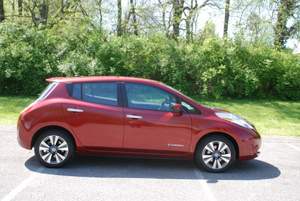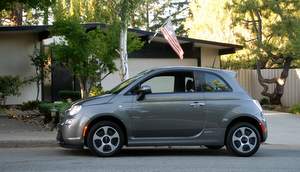
While price cuts and low lease rates have been moving electric cars like never before, resulting in “sold out” models and tight supplies at some dealerships, there may be a dark side to the deals. Last week, ALG Inc., the organization recognized by the auto industry as the arbiter of the residual values for vehicles, cut those values for electric vehicles, plug-in hybrids and conventional hybrids because of high incentives, price cuts and a potential glut of models, according to a report in Automotive News.
As an example, ALG dropped the predicted residual value of a Nissan Leaf after 36 months by about $2,500. ALG values are used by banks so any rates using residual values above theirs mean the manufacturer is subsidizing the lease, which of course negatively impacts income from a vehicle. A drop in residual value like the one for the Leaf could typically raise the lease rate by $70/month.
The Leaf hasn’t been the only one dropping its retail prices, as we have noted at Clean Fleet Report. Volt dropped its price on the 2014 model by $5,000, which of course resulted in price drops for the 2013 models still on the lot. Honda’s Fit EV, Smart’s ED, Mitsubishi’s i-MiEV, GM’s Chevy Spark EV, the Fiat 500e, the Toyota RAV4 EV and Ford’s Focus Electric all have discounted lease deals aimed to boost sales. And more new models are coming on the market during 2014, including the BMW i3 and Golf-e, with the former’s announced price indicating an aggressive marketing stance by BMW.
When discounts like this happen in the rest of the auto market and residual values drop, the impact on auto companies is clear. Profits on the discounted vehicles drop and the models are often dropped or given a redesign aimed at revitalizing or repositioning them in the eyes of the consumer. For new models, it is often the kiss of death.
The concern ALG expressed reinforces talk in the auto industry about the overall weakness of the alternative fuel vehicle segment. Since several automakers have said bluntly that the vehicles are being produced solely to comply with government mandates (California’s ZEV Mandate being the main target), many have questioned their sincerity in marketing the cars or commitment to produce vehicles if there is consumer demand beyond the mandated volumes. The exception to this sentiment appears to be Nissan, led by its CEO Carlos Ghosn, who has put his company (along with partner Renault) on record as aiming for mass market electric vehicles by the end of the decade.
So the lower prices have been moving electric cars at a quicker pace than the rest of the market (overall sales numbers, though, can be characterized as miniscule but promising). Chrysler said that after offering the Fiat 500e

for the same lease price as its gas-powered models, its 2013 allotment of vehicles was sold out (though it declined to specify how many cars that was). Honda dropped its lease price on the Fit EV, which had been languishing on dealer lots, and suddenly the cars moved and dealers were clamoring for more. EV advocates used these incidents as examples of pent-up consumer demand for electric cars while automakers shrugged them off as fire sales that brought no return to the company.
Our conclusion: The drop in EV residuals is not a death sentence, but not a good sign. Residual values can change, as this drop shows, but the Leaf and the rest of the industry will need to show some sustained strength, as in substantial sales not propped up by lease deals and price drops. It’s far from a sin in the auto industry to discount models or offer incentives to move them, but because electric cars (and plug-ins and hybrids) are a new segment and still viewed somewhat skeptically by the industry, they have more pressure to be competitive. Remember, it took several years for the Prius to achieve a sales status where it was seen as anything other than a West Coast novelty, and now it sits among the top 10 of all cars in sales – after only 15 years on the market. This is a marathon, not a sprint.
Related Stories:
How To Find the Best Price For An Electric Car
Nissan’s Ghosn Bets on EVs Winning
Recent Sales of Electric Cars, Plug-ins, Hybrids & Diesels

It’s a shame really. Hybrid are the future of the civilian automotive industry. And with newer, more powerful models being released every year they become more and more attractive to consumers. I’d hate to see so many people lose out because of this.
@Brian,
It’s not at all clear that the deals are a harbinger of the endtimes for electric cars. The deals have spurred more sales (just like deals do with conventional vehicles) and that if that increased interest turns buyers into evangelists (which is likely given the early EVs performance) it could spur the segment on to more growth. It’s not a simple equation. — ed Michael Coates